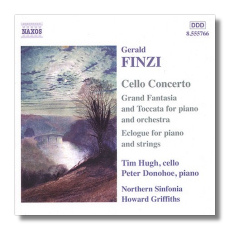
The Internet's Premier Classical Music Source
Related Links
- Finzi Reviews
- Latest Reviews
- More Reviews
-
By Composer
-
Collections
DVD & Blu-ray
Books
Concert Reviews
Articles/Interviews
Software
Audio
Search Amazon
Recommended Links
Site News
 CD Review
CD Review
Gerald Finzi

Concert Works
- Cello Concerto Op. 40
- Eclogue for Piano & Strings Op. 10 *
- Grande Fantasia and Toccata Op. 38 *
Tim Hugh, cello
* Peter Donohoe, piano
Northern Sinfonia/Howard Griffiths
Naxos 8.555766
English composer Gerald Finzi (1901-1956) was just a year older than William Walton, to whose music Finzi's is sometimes compared. Overall, however, Finzi preferred smaller idioms than Walton, and his work remains more unfamiliar. This Naxos CD brings together three of his best concertante works in fetching new performances. It is a wonderful introduction to his work.
The Cello Concerto has a valedictory quality; it was completed at the request of Sir John Barbirolli in 1955 under the shadow of the knowledge that the composer was mortally ill. The material in the slow movement, however, dates back to the 1930s. The first movement is remarkable work in that it is tragic – like English Mahler – but not self-pitying. The soloist's cadenza in that same movement is one of the finest in the literature. After the roiling first movement and the elegiac, resigned second, the finale comes as a bit of a surprise because it is largely uncomplicated by darker emotions. As one hears this concerto repeatedly, the progression of mood from one movement to the next begins to make sense, emotionally speaking.
The little Eclogue (not even 11 minutes here) was to have been the middle movement a piano concerto that Finzi began in the 1920s, and didn't abandon until 1953. Like the slow movement of the Cello Concerto, it is simple, dignified, and very English.
The same abandoned piano concerto gave rise to the Grand Fantasia and Toccata, or at least the first half of the last work on this CD. When the composer was told that the Grand Fantasia was inappropriate as a closing for his projected concerto, he put it aside, eventually revising it and adding the Toccata section for a première performance in 1953. The music, particularly the Grand Fantasia, can be described as neo-Baroque, evoking Bach without mocking or quoting him.
The performances are very good, with cellist Hugh emphasizing intimacy over the "Grand Statement," and Donohoe dependable as ever in his two works. The Northern Sinfonia has been given recessed sound by producer/engineer Tim Handley (unless the recording location is to blame), but it's not bad enough to spoil the performances, or Finzi's winning music. Highly recommended.
Copyright © 2002, Ray Tuttle




















